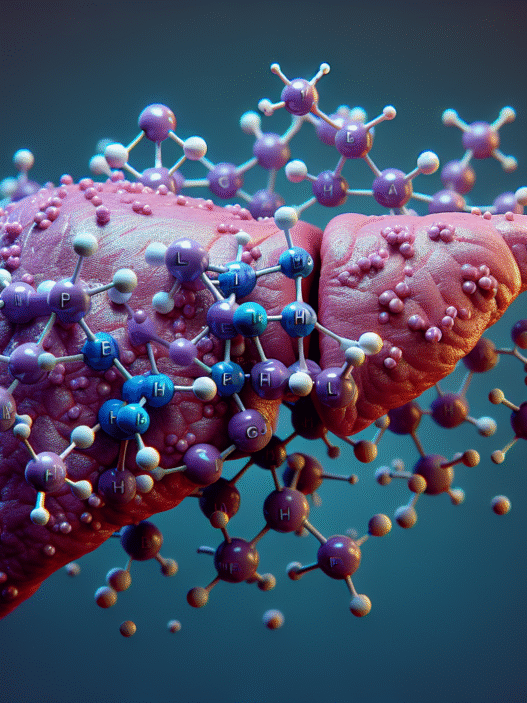Understanding Resveratrol
Resveratrol is a naturally occurring compound known for its possible health benefits, particularly in the context of aging and disease prevention. It is mainly found in certain plants and foods.
Definition and Sources
Resveratrol is a polyphenolic compound classified as a phytoalexin produced by various plants in response to stress, injury, or microbial infections. It is most commonly associated with red wine but can also be found in other sources such as:
| Source | Resveratrol Content |
|---|---|
| Red Wine | High |
| Grapes | Moderate |
| Blueberries | Low |
| Peanuts | Moderate |
| Dark Chocolate | Moderate |
For a detailed understanding of where to source this compound, explore our article on what food is highest in resveratrol?.
Absorption and Metabolism
One of the key challenges in utilizing resveratrol for health benefits is its low bioavailability. After oral consumption, resveratrol undergoes rapid metabolism in the body. It is primarily converted into various metabolites, which include glucuronide and sulfate forms, shortly after it is absorbed. The bioavailability of resveratrol is extremely low, with only trace amounts detected in the bloodstream (NCBI).
The following table summarizes the metabolic forms of resveratrol after oral administration:
| Metabolite | Form |
|---|---|
| Resveratrol-3-O-sulfate | Sulfate |
| Resveratrol-4′-O-glucuronide | Glucuronide |
| Resveratrol-3-O-glucuronide | Glucuronide |
These metabolic pathways significantly impact its overall efficacy and the potential therapeutic uses of resveratrol. Understanding these factors is crucial for those interested in the benefits and limitations of resveratrol supplementation. For more information on the implications of taking resveratrol, visit our article on is it okay to take resveratrol every day?.
The Safety of Resveratrol
Understanding the safety profile of resveratrol is important for those considering it as a supplement. The following sections address human trials, side effects, and the interaction of resveratrol with various medications.
Human Trials and Side Effects
Resveratrol is generally well tolerated among healthy individuals, particularly when taken without other medications. A 2011 clinical trial investigated the effects of resveratrol at a dosage of 150 mg per day in obese patients, which revealed no adverse reactions. However, higher supplemental doses, particularly around 1 g/day or more, may exceed natural intake through food, increasing the likelihood of interactions with cytochrome P450 (CYP) enzymes. This can lead to clinically significant drug-drug interactions (PubMed).
Although long-term effects are not known, studies indicate that severe side effects from resveratrol, even at higher doses, have not been identified. However, individuals allergic to grapes or wine may experience allergic reactions to resveratrol.
| Dosage (mg/day) | Side Effects |
|---|---|
| Up to 150 | None reported (in clinical trial) |
| Above 1000 | Possible interactions with medications |
Interaction with Medications
Due to the properties of resveratrol, it can have significant interactions with certain medications. Resveratrol acts as a blood thinner, which can pose risks for individuals on anticoagulant medications such as warfarin, heparin, naproxen, ibuprofen, and aspirin, as it increases the risk of bleeding (WebMD). Those with bleeding disorders or at high risk for bleeding are advised to avoid supplementing with resveratrol.
It’s important for individuals to consult healthcare professionals before starting a resveratrol supplement, especially if they have ongoing health conditions or are on other medications. This is crucial for assessing whether resveratrol may pose any risks or interactions unique to their situation.
| Medication Type | Interaction Risk |
|---|---|
| Anticoagulants (e.g. warfarin) | Increased risk of bleeding |
| Anti-inflammatory drugs (e.g. ibuprofen) | Heightened bleeding risk |
For more detailed insights about the benefits and uses of resveratrol, readers can explore related topics such as what are the benefits of taking resveratrol? or what to avoid when using supplements with resveratrol, detailed in what should I not take resveratrol with?.
Potential Health Benefits
Resveratrol, a naturally occurring compound found in various plants, has garnered attention for its potential health advantages. This section highlights key areas where resveratrol may offer benefits.
Cardiovascular Health
Resveratrol has been linked to improved heart health. High doses of resveratrol supplements have associated benefits, notably in reducing systolic blood pressure levels (Healthline). It influences blood fats by decreasing the effect of an enzyme that controls cholesterol production and reducing the oxidation of “bad” LDL cholesterol. This action can potentially lower total cholesterol and body weight, contributing positively to cardiovascular health.
| Effect | Description |
|---|---|
| Blood Pressure | May reduce systolic blood pressure |
| Cholesterol Levels | Aids in lowering total cholesterol |
| Weight Management | Potentially helps in body weight reduction |
Cognitive Function
Resveratrol demonstrates promise in supporting cognitive health. Its antioxidant and anti-inflammatory properties may protect brain cells from damage, which could slow down age-related cognitive decline. Studies suggest that resveratrol could improve memory and overall brain function, making it a beneficial supplement for natural health seekers looking to maintain cognitive abilities as they age.
| Benefit | Potential Impact |
|---|---|
| Brain Cell Protection | May protect against damage |
| Cognitive Decline | Potentially slows age-related decline |
| Memory Improvement | Positive effects on memory function |
Joint Health
Research indicates that resveratrol may offer relief for joint health. It has been studied for its potential to prevent cartilage breakdown and reduce inflammation, which are critical factors for individuals dealing with arthritis-related pain (Healthline). This compound’s anti-inflammatory properties could provide a natural approach to managing joint pain and enhancing mobility.
| Application | Benefits |
|---|---|
| Cartilage Preservation | May prevent breakdown |
| Inflammation Reduction | Potentially reduces joint inflammation |
| Pain Relief | Offers implications for arthritis treatment |
Understanding these potential health benefits is essential for anyone interested in the holistic applications of resveratrol. For further information on the advantages of taking this compound, visit our article on what are the benefits of taking resveratrol?.
Risks and Contradictions
Resveratrol, while praised for its potential health benefits, is not without its risks and contradictions. It is important for individuals considering resveratrol supplements to be aware of how this compound may affect certain health conditions.
Estrogen-Sensitive Conditions
Resveratrol can mimic the hormone estrogen in the body, which raises concerns for individuals with estrogen-sensitive conditions. Those suffering from conditions such as endometriosis, uterine fibroids, or reproductive cancers should avoid taking resveratrol due to its estrogenic properties. The compound can exhibit both estrogenic and antiestrogenic effects, which may influence hormone-related cancer cells. For this reason, individuals with a history of hormone-sensitive health issues must exercise caution and consult healthcare providers before using resveratrol supplements.
Bleeding Disorders
For individuals with bleeding disorders, caution is also advised when considering resveratrol supplementation. Resveratrol has antioxidant properties, and while studies have not widely reported severe side effects, those with health conditions that affect blood clotting may be at risk. It is essential for anyone experiencing these conditions to consult a doctor prior to starting resveratrol supplements. Health seekers should be aware of the potential interactions and effects of resveratrol, especially in the context of other medications that may influence bleeding.
In summary, while resveratrol may offer potential benefits, it is not universally safe for all individuals. Understanding these risks is a critical part of informed health and wellness choices. For information on the possible health benefits of resveratrol, explore our article on what are the benefits of taking resveratrol?.
Resveratrol and Cellular Impact
Biphasic Effects
Resveratrol exhibits complex behavior within cellular systems, often displaying what is known as biphasic effects. This means that its impact can vary significantly based on the concentration used, influencing its role as either an antioxidant or a pro-oxidant. At lower doses, resveratrol primarily functions as an antioxidant, helping to mitigate oxidative stress and promote cellular health. However, at higher concentrations, it can shift towards a pro-oxidant role, leading to detrimental effects such as DNA damage and reduced DNA repair pathways (NCBI).
The following table highlights some of the different effects of resveratrol at varying concentrations:
| Resveratrol Concentration | Effect | Implications |
|---|---|---|
| Low | Antioxidant | Reduces oxidative stress |
| Moderate | Neutral/Variable | May maintain balance in cells |
| High | Pro-oxidant | Causes DNA damage and apoptosis |
Potential Toxicity
While resveratrol is often celebrated for its purported health benefits, there are concerns related to its potential toxicity, especially at chemotherapeutic doses. Research indicates that high concentrations of resveratrol can be cytotoxic not only to cancer cells but also to normal healthy cells. Toxicity has been noted in various cell types, including rat thymocytes and fibroblast cells, highlighting a concentration-dependent effect.
In particular, as resveratrol manipulates cellular oxidative stress levels, it can potentially induce DNA damage and impact the redox state of endothelial cells. This dual role makes it critical for consumers and clinicians to carefully consider the dosage and context in which resveratrol is used (NCBI).
For individuals seeking to balance the benefits and risks of resveratrol intake, it is essential to be informed about its potential side effects. It may also be advisable to consult healthcare professionals about the safety and efficacy of incorporating resveratrol into their health regimens, especially if they are considering high doses. For a deeper dive into resveratrol’s effects and benefits, check out our article on what are the benefits of taking resveratrol?.
Factors Affecting Resveratrol Efficacy
Understanding the factors that influence the efficacy of resveratrol is essential for maximizing its potential health benefits. Two primary factors are dosage and bioavailability, along with how it interacts with various health conditions.
Dosage and Bioavailability
Resveratrol’s bioavailability significantly impacts its effectiveness as a supplement. Orally consumed resveratrol has notably low bioavailability, with only trace amounts detected in plasma. A major limiting factor is the rapid sulfate conjugation occurring in the intestine and liver, which restricts how much resveratrol can be absorbed (NCBI).
Several factors influence resveratrol’s bioavailability and pharmacokinetics, including:
- Dosage: Higher doses may improve absorption.
- Formulation: Different pharmaceutical forms can affect how well resveratrol is absorbed.
- Particle Size: Smaller particle sizes enhance absorption efficiency.
- Food Matrix: Consuming resveratrol with certain foods can enhance its bioavailability.
- Gut Microbiota: The composition and health of gut bacteria can also play a role.
Table 1 summarizes the factors impacting resveratrol absorption:
| Factor | Effect on Absorption |
|---|---|
| Dosage | Higher doses may lead to improved bioavailability |
| Pharmaceutical Formulation | Variations can affect absorption rates |
| Particle Size | Smaller particles can enhance absorption |
| Food Matrix | Certain foods may help boost bioavailability |
| Gut Microbiota | Can influence how well resveratrol is processed |
Adopting strategies, such as consuming resveratrol with ribose or piperine, can notably enhance its absorption compared to traditional methods (Nutrients).
Impact on Health Conditions
Resveratrol has shown potential benefits for various health conditions due to its antioxidant and anti-inflammatory properties. For instance, it appears to protect brain cells from damage, potentially aiding in the prevention of age-related cognitive decline.
Research indicates that resveratrol may help in:
- Improving Endothelial Function: Enhances blood vessel health and function.
- Increasing Liver Fatty Acid Oxidation: Supports metabolic processes in the liver.
- Reducing Oxidative Stress: Lowers the damaging effects of free radicals.
- Enhancing Insulin Sensitivity: May benefit those with insulin resistance.
However, the results regarding its effectiveness in conditions like type 2 diabetes and cardiovascular health markers have been mixed. Factors such as the dose used, the status of gut microbiota, and the overall health of the participants in studies have been influential (Nutrients).
Overall, understanding how dosage and health conditions impact resveratrol’s efficacy can help individuals make informed decisions, particularly when considering its therapeutic potential. For more information on the benefits of resveratrol, visit our article on what are the benefits of taking resveratrol?.





















